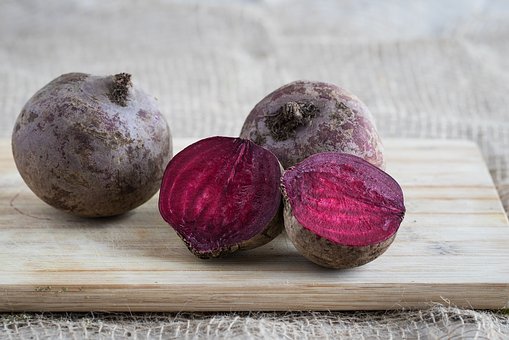
Beets are a very controversial item when it comes to dinner. Hardly anyone is on the line. You love ‘em or hate ‘em! But let me tell you what you can beat with beets. You may change your mind.
They are said to have grown in the Hanging Gardens of Babylon. The Elizabethans enjoyed them in tarts and stews. Thomas Jefferson planted them at Monticello. Medieval cooks stuffed them into pies. But not everyone is a fan. Many complain that beets have an “earthy” taste, which isn’t far off the mark. Beets contain a substance called geosmin, which is responsible for that fresh soil scent in your garden following a spring rain. Humans are quite sensitive to geosmin, even in very low doses, which explains why our beet response ranges from one extreme to the other.
Humans originally ate beet greens but not the thin and fibrous roots, which were occasionally used in medicine. The large beet leaves and stalks were consumed like chard, a close relative. The root part of the beet was cultivated for consumption in either Germany or Italy, first recorded in 1542. Its earliest form more closely resembled a parsnip rather than the bulbous shape we’re now familiar with, which began appearing near the end of the 1500s. Soon it became the most recognizable form of beet, but it wasn’t a worldwide culinary success until two centuries later. Northeastern Europe was the first area to embrace the beet root as a dietary staple; it was valued as one of the only vegetables that grew well throughout winter.
In 1747 Andreas Sigismund Marggraf, a chemist from Berlin, discovered a way to produce sucrose from beets. His student, Franz Achard, perfected this method for extracting sugar, leading him to predict the inevitable rise of beet beer, tobacco and molasses, among other products. Though not entirely convinced that beets had a bright future, the King of Prussia eventually subsidized a sugar beet industry. The first plant was built in what is now western Poland. It turned out to be a solid investment. Today, around 20 percent of the world’s sugar comes from sugar beets. Beet sugar production requires 4 times less water than sugar cane production, making it an attractive crop throughout Europe as well as in more arid countries like Egypt. Who knew?!!
Why eat a beat you may ask? Well, here’s why-
1. Lower Your Blood Pressure
Drinking beet juice may help to lower blood pressure in a matter of hours. One study found that drinking one glass of beet juice lowered systolic blood pressure by an average of 4-5 points. The benefit likely comes from the naturally occurring nitrates in beets, which are converted into nitric oxide in your body. Nitric oxide, in turn, helps to relax and dilate your blood vessels, improving blood flow and lowering blood pressure.
2. Boost Your Stamina
If you need a boost to make it through your next workout, beet juice may again prove valuable. Those who drank beet juice prior to exercise were able to exercise for up to 16 percent longer. The benefit is thought to also be related to nitrates turning into nitric oxide, which may reduce the oxygen cost of low-intensity exercise as well as enhance tolerance to high-intensity exercise.
3. Fight Inflammation
Beets are a unique source of betaine, a nutrient that helps protects cells, proteins, and enzymes from environmental stress. It’s also known to help fight inflammation, protect internal organs, improve vascular risk factors, enhance performance, and likely help prevent numerous chronic diseases.
4. Anti-Cancer Properties
The powerful phytonutrients that give beets their deep crimson color may help to ward off cancer. Research has shown that beetroot extract reduced multi-organ tumor formations in various animal models when administered in drinking water, for instance, while beetroot extract is also being studied for use in treating human pancreatic, breast, and prostate cancers.
5. Rich in Valuable Nutrients and Fiber
Beets are high in immune-boosting vitamin C, fiber, and essential minerals like potassium (essential for healthy nerve and muscle function) and manganese (which is good for your bones, liver, kidneys, and pancreas). Beets also contain the B vitamin folate, which helps reduce the risk of birth defects.
6. Detoxification Support
The betalin pigments in beets support your body’s Phase 2 detoxification process, which is when broken down toxins are bound to other molecules so they can be excreted from your body. Traditionally, beets are valued for their support in detoxification and helping to purify your blood and your liver.
Chefs are coming up with all sorts of clever ways to make these amazing vegetables, Try some!!
Happy Healthy Eating! Dana
https://articles.mercola.com/sites/articles/archive/2014/01/25/beets-health-benefits.aspx
http://www.pbs.org/food/the-history-kitchen/history-beets/









